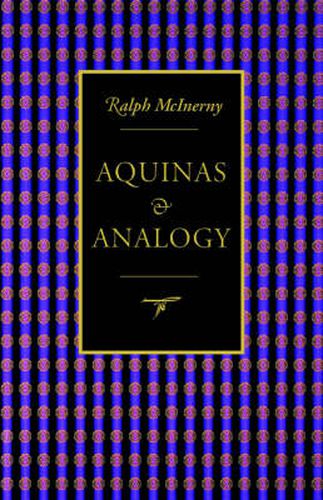Readings Newsletter
Become a Readings Member to make your shopping experience even easier.
Sign in or sign up for free!
You’re not far away from qualifying for FREE standard shipping within Australia
You’ve qualified for FREE standard shipping within Australia
The cart is loading…






In his De nominum analogia, Cajetan introduced a spurious distinction between analogy of attribution and analogy of proportionality that is not found in Aquinas’s writings or anywhere else. Cajetan’s mistake became a commonplace and it is still uncritically accepted today. In Aquinas and Analogy,/em>, Ralph McInerny carefully traces the source of the confusion to Cajetan’s misunderstanding of a text from Aquinas’s commentary on the Sentences and shows how unwarranted and how misleading that distinction is. Another source of confusion has been the attempt to equate the Greek word analogia and its Latin equivalent to try to find word for word correspondences between Aristotle and Aquinas. For instance, what Thomas calls analogy of names is consonant rather with what Aristotle describes as legetai pollachos, what
is said in many ways.
McInerny brings in all relevant texts and analyzes the points they make, and he makes comparisons with the famous notion of focal meaning used by the Oxford philosopher G.E.L. Owen.
McInerny shows how the word ‘analogy’ is itself analogous and gives an enlightening expose of the analogy of names. He criticizes Enrico Berti’s and Ramirez’s influential treatments of analogy, as well as those of a few others for unaccountably falling under the spell of Cajetan’s errors. He takes the reader further still into the question of the ‘analogy of being’ and also of the ‘argument by analogy.’ But his conclusions steer the reader back to the momentous issues now made accessible by a clear understanding of analogy.
The basic distinctions McInerny introduces, his criticism of the central piece in the literature, Cajetan’s De nominum analogia, the applications he makes to problems such as that of the nature of metaphysics or of logic, his knowledge of contemporary debates on related topics, combine to make his contribution unique. Basic philosophical issues are renewed by this book and so is one’s reading of Aquinas, Aristotle, and their many interpreters past and present.
$9.00 standard shipping within Australia
FREE standard shipping within Australia for orders over $100.00
Express & International shipping calculated at checkout
Stock availability can be subject to change without notice. We recommend calling the shop or contacting our online team to check availability of low stock items. Please see our Shopping Online page for more details.
In his De nominum analogia, Cajetan introduced a spurious distinction between analogy of attribution and analogy of proportionality that is not found in Aquinas’s writings or anywhere else. Cajetan’s mistake became a commonplace and it is still uncritically accepted today. In Aquinas and Analogy,/em>, Ralph McInerny carefully traces the source of the confusion to Cajetan’s misunderstanding of a text from Aquinas’s commentary on the Sentences and shows how unwarranted and how misleading that distinction is. Another source of confusion has been the attempt to equate the Greek word analogia and its Latin equivalent to try to find word for word correspondences between Aristotle and Aquinas. For instance, what Thomas calls analogy of names is consonant rather with what Aristotle describes as legetai pollachos, what
is said in many ways.
McInerny brings in all relevant texts and analyzes the points they make, and he makes comparisons with the famous notion of focal meaning used by the Oxford philosopher G.E.L. Owen.
McInerny shows how the word ‘analogy’ is itself analogous and gives an enlightening expose of the analogy of names. He criticizes Enrico Berti’s and Ramirez’s influential treatments of analogy, as well as those of a few others for unaccountably falling under the spell of Cajetan’s errors. He takes the reader further still into the question of the ‘analogy of being’ and also of the ‘argument by analogy.’ But his conclusions steer the reader back to the momentous issues now made accessible by a clear understanding of analogy.
The basic distinctions McInerny introduces, his criticism of the central piece in the literature, Cajetan’s De nominum analogia, the applications he makes to problems such as that of the nature of metaphysics or of logic, his knowledge of contemporary debates on related topics, combine to make his contribution unique. Basic philosophical issues are renewed by this book and so is one’s reading of Aquinas, Aristotle, and their many interpreters past and present.